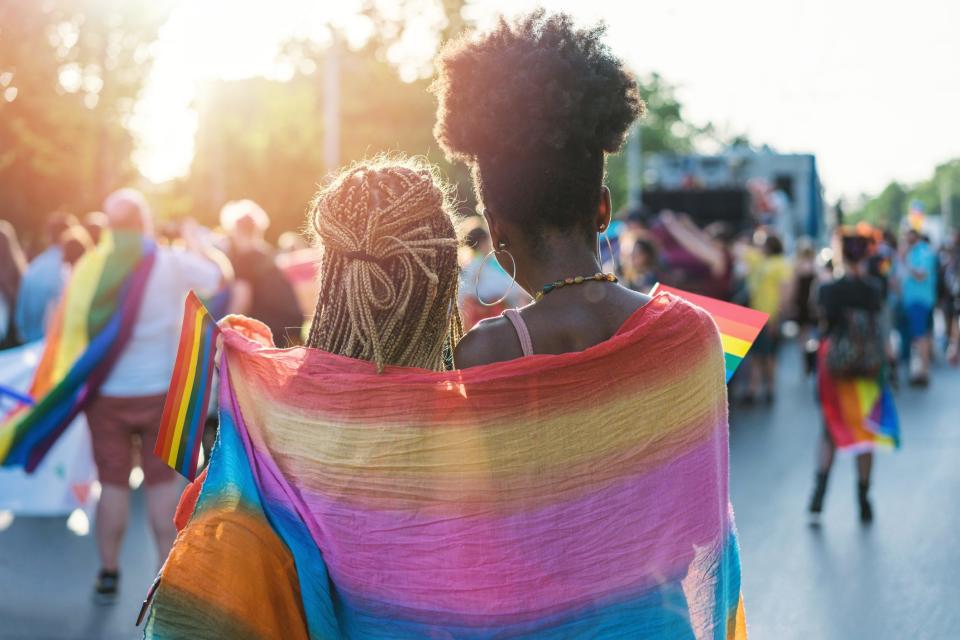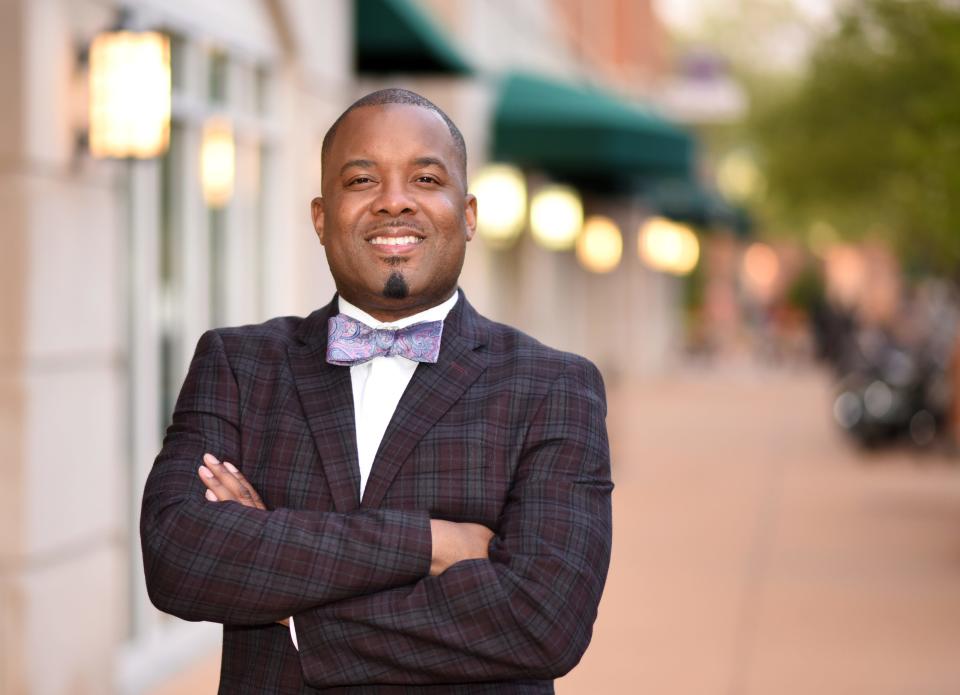Much of our slang comes from the Black community. Not acknowledging that perpetuates racism.
Tap through TikTok and you'll fall down a slang-filled, dance-crazed rabbit hole a la "Alice in Wonderland."
A piece of advice: Don't repeat everything you hear on your sojourn down. Especially if you are white.
White people – on social media and in real life – regularly appropriate African American Vernacular English, or AAVE, like "slay" and "sis" without thinking, and some of these phrases come directly from the Black LGBTQ community. Experts say this perpetuates racism, erases Black contributions and fuels cultural misunderstandings. Simply put: It's Black linguistic appropriation.
"The divorcing of Black people from the way that we talk is really just another way of liking what Black people do, but not liking Black people," Nikki Lane, assistant professor at Spelman College, says. "It's very Elvis to me. You'll take our music, but you don't give us credit."
Take terms like "reading" (artfully insulting someone) or "shade" (a subtle insult). People gobbled up these words after watching the famous ballroom documentary "Paris is Burning," but the film didn't create them.
E. Patrick Johnson, dean of Northwestern's School of Communication, says appropriating and commodifying Black culture from Black hairstyles to queer language is nothing new and in today's society it's inevitable that it will happen.
"But what is so wonderful is that these cultures keep inventing new language based on their experiences," Johnson says. "So, while it is true that things are 'stolen' it’s also true that language keeps getting invented anew."
The history of AAVE
AAVE partially grew out of the need for Black people to communicate and dates back to enslavement, according to April Baker-Bell, author of "Linguistic Justice: Black Language, Literacy, Identity, and Pedagogy."
"When they were enslaving Africans (they used) language planning to make sure that two Africans who spoke the same language could not get together because they didn't want that to lead to a revolt ... and Black language was developed in spite of that," Baker-Bell says.
Baker-Bell says Black language is a legitimate language with syntax, grammatical features, phonology and semantics. But when Black people speak AAVE, it's seen as unprofessional, and they can be perceived as "intellectually inferior" for speaking it.

"It's anti-Black linguistic racism. It's truly anti-Blackness passing through our language in the ways we're told we have to code switch," Baker-Bell says describing how Black people often have to change their way of speaking to fit into what's seen as a cultural norm.
Lane scoffs at the idea of a room full of white people saying "let's spill the tea" with no Black people present.
"You care about what we say, you're interested in how we speak, you're interested in taking things from us because language is a cultural production," she says. "It's something that Black folks create together. So you'll take that but you won't take us."
What's even more problematic is "white people coming up off of our language," Baker-Bell says, like TikTokers rising to influencer status for videos that appropriate these phrases and companies using Black language in their marketing.
How does language move across racial lines?
The expansion of social media pushed the floodgates ajar for language practices or terms that originated within the Black community to spread exponentially among white people, Lane says. TikTok in particular "is literally based on mimicry," she says.
Johnson says appropriation is inevitable and it's common for Black language to be misattributed and though it's "disheartening" when culture is "commodified without any acknowledgment of remuneration," he has hope this can be rectified by social media.
"In some ways, social media has provided a level playing field such that these communities can create their own platforms to capitalize on their cultural forms – sometimes before they are appropriated by the majority culture," Johnson says.
Non-Black people speaking this way risk not only appropriating but using certain language incorrectly. Like walking in shoes that don't fit.
Last month, "Saturday Night Live" aired a skit written by Michael Che titled "Gen Z Hospital" where the premise was to mock words like "bestie," "sis" and "bruh" and attributed the terms as Gen Z language.
For Black language to be couched as Gen Z language is Black erasure and continues to be dismissive of Black people's contribution to mainstream white culture. Especially when oftentimes, Black creators don't profit off their labor.
When and under what circumstances non-Black people can use Black language is a conversation that's irrelevant for now, Baker-Bell says.
"When we see Black people not being killed, Black people not being discriminated against, Black kids being able to learn and thrive with their own language, we can have that conversation," Baker-Bell says.
Necessary read: A stylist once left my Black hair a 'hot mess' on set. The embarrassing problem Hollywood needs to address
Where Black queer people fit in
Separating language between Black queer people and the rest of the Black community would be like picking up individual grains of sand off a beach.
"The majority of Black queer people live in and among straight people," Lane says. "We don't live separate lives, apart from African American people who are in our family who may be heterosexual. We don't live in little silos, and language happens in community."

While you might hear Black queer people use the word "slay," for instance, Lane credits Black women with the term.
Separately, Black queer people have developed turns of phrases to communicate with each other in potentially dangerous, homophobic settings.
For example, "a word like family, where you're not talking about, like a familial relation, necessarily, but you could be talking about other gay folk."
Jeffrey McCune, director of the Frederick Douglass Institute for African and African American Studies at the University of Rochester, questions why so much of Black queer cultural production snakes its way into greater society.

"It does say something about the society itself, and the scarcity of creativity," McCune says. "But it also says that out of the sea of a lot of trauma, and joy, Black people are producing ways of interpreting, explaining and reading the world in which we live."
The most marginalized community is the Black queer community, even "within our own community," Baker-Bell explains, adding when Black trans people or LGBTQ members are murdered by police, there is less of a collective outrage and attention on those cases.
"These terms feel fun to everybody else, but you don't understand what that grew out of among Black queer people and how they use that to communicate within their own groups or how these words are used to push against the oppression they experience," Baker-Bell says. "It's not for everybody to engage and play in."
What is the answer?
In short: Study up on where phrases come from and pause before repeating a new word or phrase. And if you do choose to use these terms, make sure you're not contributing to the marginalization of Black communities.
Lane wonders why anyone not a part of the Black community would need to use AAVE in the first place. Is the reason you're saying something because you've heard everyone else saying it? Have you asked them where they heard it from?
Remember, too, that what Black people post on social media isn't all fun and games but a product of labor.
"So many of these expressions are opportunities for Black people to release themselves of the trauma of white supremacy and anti-Blackness," McCune says. "The casual use of Black queer phrases or Black community phrases is another slap in the face or a rejection of the idea that these things emerge out of trauma and anti-Blackness."
There is no way to meaningfully police people's language – so it's up to white people to not "spill the tea" so much that it makes it feel like their own. "We need a white public that is not interested in utilizing terms that they know is not a part of their dining room table vernacular," McCune says.
This article originally appeared on USA TODAY: Slang comes from Black, LGBTQ communities. Not honoring that is racist

